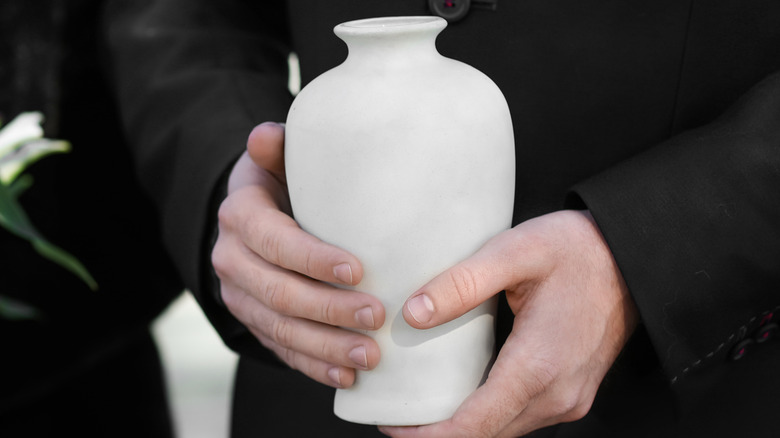What Happens To Your Ashes If There's No One To Claim Them?
It's an uncomfortable topic to think about, but it is a fact of life. We are all mortal, which means that at some point, every one of us is going to die. Usually, after someone passes, there is a memorial service, where loved ones honor and share stories about the dead, and then the body is laid to rest, either through burial or through cremation. According to the Cremation Association, in North America, cremation is the slightly more popular option, with about 54.6 percent of remains cremated in 2019 and about 56.1 percent cremated in 2020, with rates expected to continue growing in the future.
When a person is cremated, their body is placed in a combustible casket and taken to the cremation chamber of a crematory, where they are incinerated, casket and all. The body typically burns at between 1,400 to 1,800 degrees Fahrenheit for about one to three hours before it is finally reduced to bone fragments and skeletal remains, according to Cremation Resource. After the remains have cooled, any metal objects that may have survived the burning process, such as dental work, surgical screws, or medical implants, are removed from the mixture with a magnet or forceps, before the remains are further ground into a fine, sand-like consistency using a cremulator. Finally, the cremains are placed into an urn or temporary container and given to the deceased's loved ones.
Ashes are buried, interred, or scattered after a specified period of time
However, as sad as it may seem, some cremains are never claimed. When that happens, the funeral home has a bit of a problem on their hands: What to do with those unclaimed remains? About 1% — or around 15,000 sets — of human remains are unclaimed per year in the U.S. (via Verywell Health). Initially, most of these cremains are placed into temporary storage in the crematory, funeral home, or even a hospital, in hopes they may be picked up eventually.
However, after some time has passed, funeral homes need to find a more permanent storage solution for these unclaimed ashes. According to Verywell Health, some institutions eventually bury the urns in a mass grave, or inter them in a columbarium — a structure that holds urns. Some states also allow funeral homes to scatter the ashes over a cemetery or designated area after a specific amount of time has passed. In all cases, the company must retain detailed records of where and how the remains were stored or disposed of, in case someone ever does come seeking the ashes. However, before they resort to these solutions, most crematoriums and funeral homes do make every attempt to contact the deceased's relatives and reunite them with the remains.

